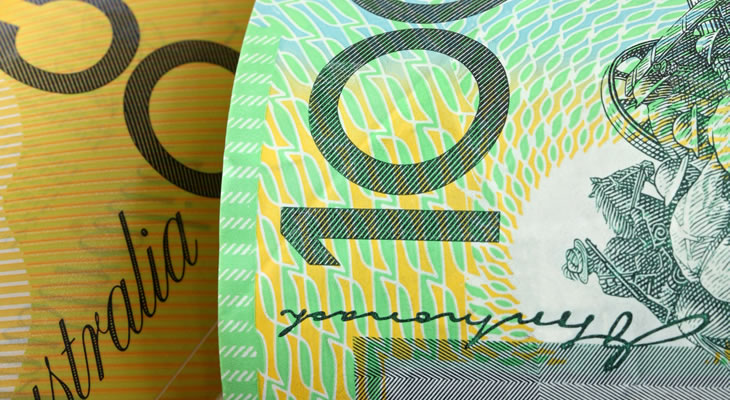Pound to Australian Dollar Exchange Rate Selloff Continues amid Stronger Risk-Sentiment
A combination of strong Australian data and rising demand for riskier trade-correlated currencies left the Australian Dollar (AUD) one of this week’s strongest major currencies, and the Pound Sterling to Australian Dollar (GBP/AUD) exchange rate has plunged.
Since opening this week at the level of 1.7877, GBP/AUD spent most of the week trending with a downside bias. In the middle of the week, rising risk-sentiment left GBP/AUD tumbling.
GBP/AUD continued to fall until the end of the week. This morning, GBP/AUD touched on a three-week-low of 1.7619 before rebounding slightly, and the pair is on track to have lost over two cents throughout the week overall.
The Pound’s (GBP) weakness lightened slightly at the end of the week, as Britain’s latest growth stats beat forecasts. However, ultimately the Australian Dollar remained more appealing thanks to risk-sentiment and the latest Australian data.
Investors have been much more willing to take risks and buy riskier currencies like the Australian Dollar on hopes for progress in US-China trade negotiations, as well as lower Federal Reserve interest rate hike bets.
Pound (GBP) Exchange Rate Outlook Limited as Investors Fear General Election Possibility
The Brexit process may get messier yet before it begins to cool or offer any of the vital clarity markets and businesses hope for.
All eyes are on UK Parliament heading onto next week, as Tuesday will see Parliament vote on whether or not UK Prime Minister Theresa May’s long-negotiated Brexit deal will be passed into UK law.
The deal passing would lead to a soft Brexit. The issue for the outlook is that very few analysts believe May’s deal has the necessary support to pass.
This has led to market speculation of how else the Brexit process could unfold before the formal Brexit date on the 29th of March. With a worst-case scenario ‘no-deal Brexit’ still seen as possible, the Pound is unappealing.
Investors are also spooked by the possibility of a general election. Leader of the opposition Labour Party, Jeremy Corbyn, has indicated that his priority is a general election rather than a second referendum.
The deeper political uncertainty that would be caused by a snap election mere months before the formal Brexit date has made investors even more hesitant to buy Sterling.
Australian Dollar (AUD) Exchange Rates Bolstered by Australian Retail Stats
Investors found the relatively risky Australian Dollar highly appealing last week. While this was largely due to US and China news making investors more willing to buy riskier trade-correlated currencies, Australian data helped.
Friday’s Asian session saw the publication of Australia’s November retail sales results. These were forecast to have remained at 0.3%, but instead climbed to 0.4% and indicated that Australia may have seen stronger growth in Q4 2018 than expected.
According to Robert Thompson from RBC Capital Markets:
‘The risk to our Q4 consumption input into economic growth is now skewed a little to the upside,
Spending benefited from the increasing impact of November sales events including Black Friday, The major caveat is that it could represent some pulling forward of Christmas-time consumption out of December.’
This gave the ‘Aussie’ a late-week boost, though the currency also remained appealing to investors seeking riskier assets.
Signs of progress in US-China trade negotiations, as well as lower Federal Reserve interest rate hike bets, have made investors more eager to take risks and buy currencies like the Australian Dollar.
Pound to Australian Dollar (GBP/AUD) Exchange Rate Outlook to be driven by UK Political Developments
While much of this week’s Pound to Australian Dollar exchange rate movement has been driven by shifts in market risk-sentiment leading to Australian Dollar strength, markets will be carefully watching UK political news next week.
On Tuesday, the UK Parliament vote on Prime Minister Theresa May’s negotiated Brexit deal will finally take place. The deal is not expected to pass, and the deal being blocked will result in the Brexit process being left at a standstill as politicians seek a resolution.
Thanks to an amendment voted on last week, Parliament expects the UK government to present a ‘Plan B’ to MPs within days following the deal being blocked.
If a ‘no-deal Brexit’ becomes the government’s course of action, the Pound could be in for major losses. A snap election being called would also leave the Pound outlook weaker as uncertainty would surge.
Hopes for a soft Brexit or even a second referendum of some kind would leave the Pound more appealing.
Australian data due for publication next week could influence GBP/AUD too, with Australian confidence figures and home loans stats due throughout the week.
Of course, any major shifts in risk-sentiment will also drive the Pound to Australian Dollar (GBP/AUD) exchange rate next week.


Comments are closed.